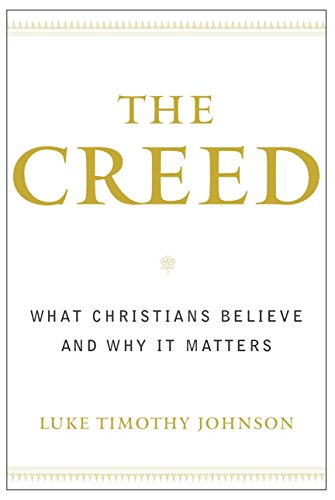Tonight we are continuing with our discussion of the second article of the Nicene Creed. Please read chapter 5 “Who for us . . . Became Human” of Luke Timothy Johnson’s The Creed: What Christians Believe and Why it Matters.
As we have recognized, the language of the Creed is inadequate to fully express its subject matter. As the Syrian theologian Philoxenus of Mabbug (d.653) once observed in regard to the Incarnation “Such doctrines of the Christian faith are mysteries, and whoever knows them knows that they cannot be grasped, and whoever grasps them knows they cannot be explained.” As Johnson points out, when the Creed speaks of the Incarnation it uses the mythic language of a descending/ascending deity. Throughout pagan religions, the gods periodically descend upon humanity. Sometimes this descent is for mischief (such as Zeus impregnating virgins) or for human enlightenment (such as Vishnu becoming incarnate in Krishna). Even in the story of the Tower of Babel, God descends to see what is occurring and to confuse our speech. Gen. 11. By the time of Jesus, both Jewish and Greek teachers had abandoned thinking of a three-tier universe or that god(s) actually and physically leave a physical heaven in the sky and come among us. Think through why the Creed retains this (pagan?) mythic language to describe the Incarnation. And when we confess that Jesus descended, are we confessing a belief in a three-tier universe and that the Son comes like Zeus, or are we confessing something different? The answer to these questions concerns whether we envision heaven as a place or as a state of being.
Another issue that arises in the Incarnation is the extent to which Jesus retains the fullness of his humanity. As Arius denied the full Divinity of the Son, so others denied his full Humanity. During the time of the Creed, an anti-Arian Syrian bishop by the name of Apollinaris began to teach that the Divinity of Jesus overwhelmed his Humanity. He reasoned that if the infinitely powerful and uncreated Son becomes incarnate in a limited, created person, the Divine would necessarily overcome the Human. And if all Humanity is fallen, how could a holy God inhabit the fallen soul of a human being? The answer to this question for Apollinaris was that Jesus lacked a human soul. As with Arius, this teaching arises in order to protect or wall off the perfect union of God and Human. Apollinaris and his theological descendants were repudiated at the Council of Ephesus (431) and the Council of Chalcedon (451) where it was specifically affirmed that Jesus Christ was completely and fully God and Human. The Chalcedonian Creed is found on page 864 of the BCP. Therefore, as we discuss the Incarnation tonight, try to wrap your mind around the sublime awesomeness and unreasonableness of what we affirm.
Dinner is at 6. The menu is Italian sausage and peppers. Discussion at 6:45. Compline before 8. Hope to see you here. Please bring a friend.
Keep in mind, Christ Jesus, who, though he was in the form of God, did not count equality with God a thing to be grasped, but emptied himself, taking the form of a servant, being born in the human likeness and being found in human form he humbled himself and became obedient unto death, even death on a cross. Therefore God has highly exalted him and bestowed on him the name which is above every name, that at the name of Jesus every knee should bow, in heaven and on earth and under the earth, and every tongue confess that Jesus Christ is Lord, to the glory of God the Father.
Philippians 2:5-11

